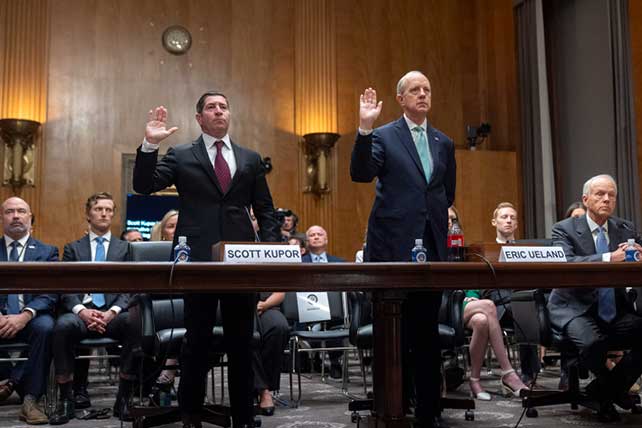(RNS) — In an Aug. 8 letter, the Secular Coalition for America and 18 allied organizations urged the U.S. Office of Personnel Management to rescind its new guidelines for religious expression in government workplaces.
The groups, which advocate for Americans with no religious affiliation, expressed “alarm” about a July 28 memorandum from OPM Director Scott Kupor offering guidance that it claimed would aid federal agencies in “robustly protecting and enforcing each Federal employee’s right to engage in religious expression in the Federal workplace consistent with the U.S. Constitution” and other laws.
But according to the secular groups’ letter, the memorandum “is rife with policies that support coercion and proselytizing” and could encourage criticism of employees’ religious beliefs and permit supervisors to pressure subordinates to convert.
Signatories of the letter included American Atheists, American Humanist Association, Center for Inquiry/Richard Dawkins Foundation for Reason and Science, Freedom From Religion Foundation Action Fund, Ex-Muslims of North America, and Military Association of Atheists and Freethinkers.
The secular organizations cited particular concern about the OPM memorandum’s guidance on permitted conversations between federal employees. “Employees may engage in conversations regarding religious topics with fellow employees, including attempting to persuade others of the correctness of their own religious views, provided that such efforts are not harassing in nature,” the memo states.
“Employees may also encourage their coworkers to participate in religious expressions of faith, such as prayer, to the same extent that they would be permitted to encourage coworkers participate in other personal activities. The constitutional rights of supervisors to engage in such conversations should not be distinguished from non-supervisory employees by the nature of their supervisory roles.”
The memo also states that “unwillingness to engage in such conversations may not be the basis of workplace discipline.” In response, the secular organizations cautioned that “unwanted conversations from a supervisor, superior, or colleague that attempt to persuade an individual that their sincerely held beliefs are incorrect is often harassment.”
The OPM memorandum warned that Title VII of the Civil Rights Act of 1964 prohibits discrimination against an individual’s religion in the workplace. “Title VII requires employers to reasonably accommodate an employee’s religious observances, practices, and beliefs unless doing so would cause an undue hardship on the conduct of the employer’s business,” it reads.
An appendix to the five-page memorandum offers permissible forms of public expression, including “(a) park ranger leading a tour through a national park may join her tour group in prayer” and “(a) doctor at a Veterans Affairs (VA) hospital may pray over his patient for her recovery.”
The memo also outlines that an employee can keep religious items on their desks, such as Bibles, jewelry and religious items such as crosses, crucifixes and mezuzahs, and can use Bibles, rosary beads or tefillin during work breaks.
“Federal employees should never have to choose between their faith and their career,” Kupor said in a statement when the guidelines were announced in July. “This guidance ensures the federal workplace is not just compliant with the law but welcoming to Americans of all faiths. Under President Trumpʼs leadership, we are restoring constitutional freedoms and making government a place where people of faith are respected, not sidelined.”
The guidelines are similar to ones issued in 1997 by the Clinton administration, drawn up by a coalition of religious conservatives and liberals, that said it was permissible for employees to keep a Bible or Quran on their desks for reading during workday breaks. Proselytizing was also permitted as long as the person being proselytized did not ask that it stop or demonstrate that it was unwelcome.
This article originally appeared here.

